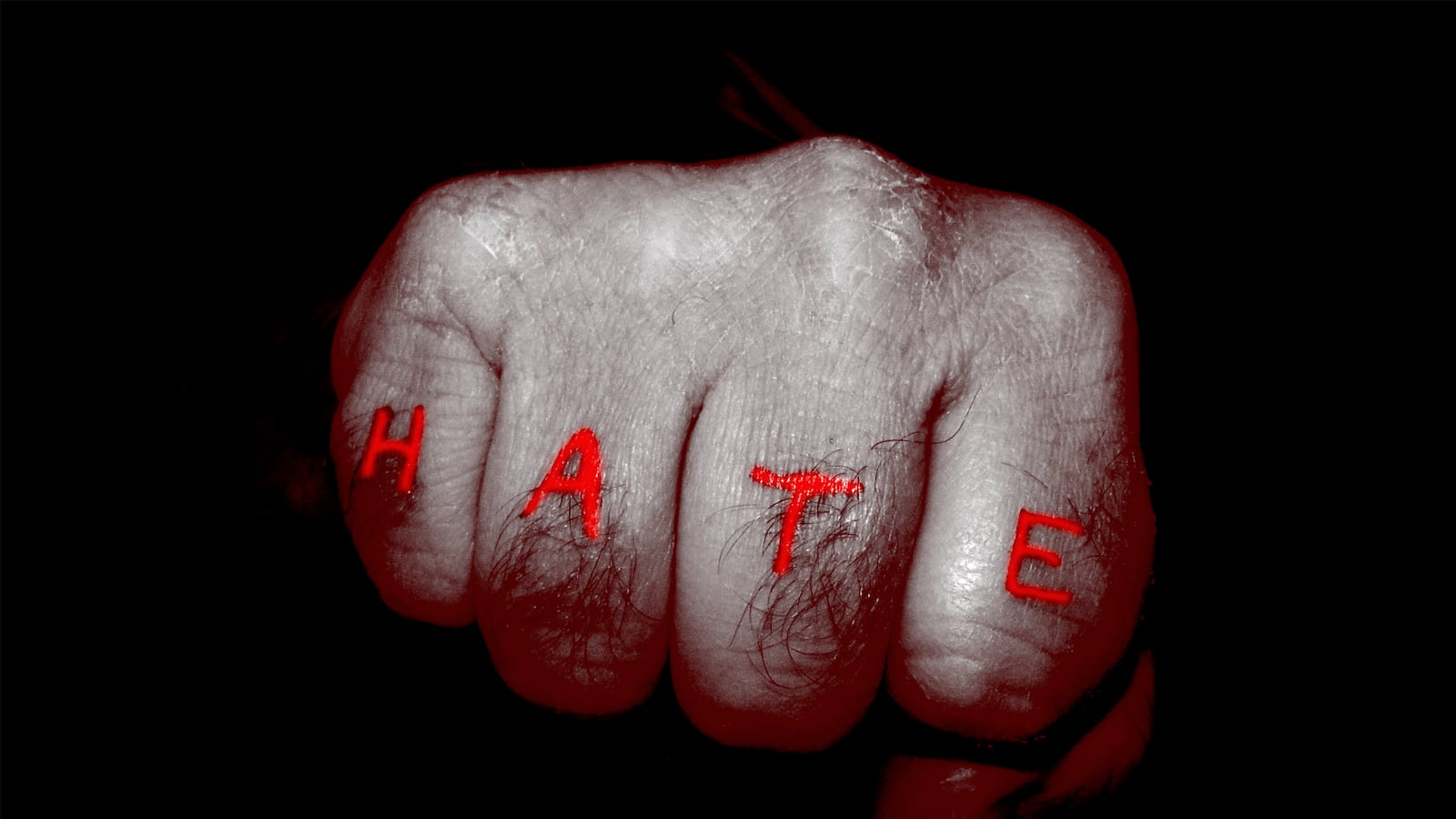If you believe the federal stats, Hawaii has no hate crimes, and one year not along ago no-name Jamestown, Tennessee, with a population less than 2,000, was the most hateful hamlet in America.
Since 1992, the feds have collected stats on hate crimes. These are offenses motivated by biases involving some kind of race, religion, disability, or sexual orientation. From the obvious lynchings and burning crosses to more arbitrary assaults and verbal epithets, hate crimes can take on a variety of forms. The process of compiling the data, the feds claim, helps them to smoke out groups “that preach hatred and intolerance” and ultimately “plant seeds of terrorism across our country.”
But what if the data we rely on is bunk? What does that say about the FBI’s ability to take down these terrorist seed-planters? And how do we begin to understand which communities are tolerant and which are not?
Take Hawaii. Unlike all other states in the union—which rely on state police departments and sheriffs’ offices to submit hate crimes data to the FBI—Hawaii has a go-it-alone policy and lets the attorney general’s office keep a running tally.
And if you give Jamestown, Tennessee, a closer up and down, officials there say, it isn’t rife with racist attacks, despite what the data suggests.
“I think whoever filled out the [FBI] forms doesn’t understand the definition of a hate crime and was just pissed off at their neighbors,” said former Fentress County Sheriff Tom Choate, the top cop overseeing Jamestown in 2012, when the FBI documented 29 hate-crime incidents there.
To put the stark number in context, Memphis, with a population of 655,000 that same year, registered fewer hate crimes—27—than puny Jamestown.
Other than a couple of Jamestown’s homicides (“all family feuds”) and a defaced church (it wasn’t anti-Christians but “doped-up boys”), the hamlet is as sleepy as it gets, Choate said.
Former Fentress County Assistant District Attorney John Galloway, who stepped down this year, acknowledged the numbers stink. “I don’t know how it’s happening. Either they’re putting it in hate of the neighborhoods or hate by ex-wife,” he mused.
Galloway, who now practices law privately, said he couldn’t substantiate the numbers. “I’m not aware of a single instance of a hate crime in Fentress County,” he told The Daily Beast.
He said there were only “five or six blacks” living in the entire county, which includes Jamestown.
The current assistant district attorney for Fentress County was just as stumped. “Wow, 29,” Phillip Kazee told The Daily Beast. “I’m floored.”
Kazee, who served as a public defender in the county for years, said he could think of no explanation for the number. “I was a defense attorney for years in this area, and I’m not aware of ever hearing of a single hate crime. That’s just really baffling.”
What’s more, the 2013 FBI Hate Crime Report omitted Jamestown, Tennessee. One could assume that little hate crime problem has just been eradicated.
Stephen G. Fischer Jr. at the FBI’s Criminal Justice Information Services (CJIS) couldn’t explain why the region was plagued one year with 29 hate crimes and then invisible the next.
“Your questions would be best answered by officials from Jamestown, TN,” he wrote in an email. But the officials in Jamestown can’t explain how the 29 arrived in the first place, and calls to the new sheriff were not immediately returned.
Fischer pointed out that the FBI was merely compiling the data. “Submission of data is voluntary,” he wrote back in response to questions The Daily Beast submitted. “For a number of reasons agencies may not be able to submit data every year.”
So what is happening in Jamestown?
The numbers are “screwy,” said Mark Potok, senior fellow at the Southern Poverty Law Center (SPLC). “There are enormous numbers of hate crimes that are not reported to police. And there are an enormous number of hate crimes that are reported that are miscategorized.”
The FBI says 6,222 hate crimes were committed nationwide in 2012.
Potok said those “stats are not much use” and rely on dubious sourcing at best. The true number of hate crimes in the U.S., he said, is almost 40 times higher than what the FBI is reporting.
Indeed, the Bureau of Justice Statistics (BJS), a division of the Justice Department, has counted far more hate crimes. In its recent report the agency cited 293,800 hate crimes in 2012.
In general, most communities try to play it conservative when it comes to hate crimes. “They don’t want to be known as a hotbed of hate,” Potok said.
Hawaii has remained the hotspot for tourists from around the world trying to escape to paradise. But for the Padron family back in 2008, Hawaii was Hades.
Celia Padron and her husband, Gustavo, were on a cruise with their relatives and opted to take an excursion to Maui. They loaded up in a caravan and headed to see the black sands of Makena State Park.
Once they arrived, Celia Padron told The Daily Beast, her nieces started to comb their hair, and they were approached by two “large” Hawaiian teens. One was clutching a baby.
“‘Do you think you’re pretty?’ one of the girls hissed. ‘Take your white asses off our beach.’”
Punches flew after that.
One of the nieces was cold-clocked, Padron said. “And the girl holding the baby in her arm was trying to punch the girls, too,” she remembered.
Cops were called, and Padron was warned to let the assault go.
“The policeman said, ‘Chances are the judge is going to be Hawaiian, and he is going to side with the other guys.’”
The beaten family decided to leave without filing formal charges. But ask Padron if she will ever set foot again on Hawaii sand—black, yellow, or white—and her answer is a blunt no. “You can pay me $1 million and I will not go back,” she said. “They don’t deserve tourism or to be American. They should give them back their monarchy and get them out of the United States, and let them solve their problems by themselves.”
Padron’s experience was an isolated incident, Keanu Sai, a renowned Hawaiian political scientist, told The Daily Beast. “I wouldn’t say Hawaii is a perfect melting pot of ethnicities, but you don’t really see a sense of hate like it’s driven in America,” he said.
Dr. Sai also helped clear up the definition of what some say is a derogatory slur: “haole.”
“In the Hawaiian language, ‘haole’ means foreigner,” he said, but today it is usually used to refer to Caucasians. There are many variations, from the congenial to the confrontational. “It could mean for someone to say, ‘I am part haole as well as native Hawaiian by ethnicity,’ or it could be used verbally to tell a Caucasian to stop hogging the waves—that speaks to being arrogant or self-centered.”
Dr. Sai said he considers his actor-cousin—Keanu Reeves—part haole. “He, like myself and all my other cousins from Kuli‘ou‘ou Valley on the island of Oahu, are all part haole, just like many other native Hawaiian families.”
Combing through Hawaii’s crime report, it’s clear that there have been so-called hate crimes in the 50th state—despite the strange federal statistics. Around the same time as the Padrons were venturing to Maui, a group of campers in Ho’okena Beach on the Big Island were ambushed by five Hawaiian men. Tossing racial epithets and death threats, the men urged the party, which included children, to leave the island before roughing some of them up.
In 2009 the Hawai'i Department of Education was cited for failing to curb routine bullying and name-calling; kids were using derogatory words including “f--king haole,” “stupid haole,” “haole b-tch," “haole whore,” “Micro,” and “Jap.”
The Hawaii attorney general’s office said it believes its methodology for evaluating hate crimes is more precise than the FBI’s.
“The FBI program is merely set up at the police level,” Paul Perrone, the office’s chief of research and statistics, told The Daily Beast. “When an alleged incident becomes known to the police, they don’t necessarily have all of the information…Ours waits until the case is concluded and we know everything that has happened along the way.”
“We can’t report our date to the FBI because they are incompatible. They use police data and we use police, prosecutor data, and make a determination after an incident has been investigated and concluded,” Perrone added. “They won’t accept our data, but we do it our own way, and we think our way is quite superior to the FBI program.”
Honolulu-based Special Agent Tom Simon, who is also a spokesman for the FBI, countered that the state could show a little more Aloha spirit and get with the rest of the country in reporting its hate crimes and other crimes, as well.
“As far as the reporting goes, the FBI wishes Hawaii’s attorney general’s office—and all municipalities around the nation—would do a more thorough job of reporting all crime statistics. It would enable law enforcement to marshal our resources where we could do the most good,” Simon told The Daily Beast.
In terms of the state’s maladies, hate crimes are low on the list. “Each year, the Honolulu FBI only receives about one or two hate crime complaints with any merit,” Simon said, adding that the local authorities usually take charge of the investigation.
But his agents aren’t exactly sitting around like the Maytag repairman, either. There’s just not that much hate to investigate, he said: “We have agents devoted to civil rights in Hawaii, and they would be in a position to know if there was a crime problem of any magnitude.”
“We would never fail to take action on a complaint that merits an FBI investigation,” he added. “The phone just isn’t ringing here with calls from hate-crime victims. If it’s a crime problem here, it’s not one that is being reported to the feds.”
Mark Kawika Patterson, who has been the warden for multiple correctional facilities in Hawaii, said what is ailing the region is not hate crimes but drugs.
“Their ice epidemic is huge,” he said, referring to methamphetamine. “It’s broken up so many families. It’s not because of hate, it’s because we have so many addicts running around.”
And while some may point to native Hawaiians expressing anger over losing their sovereignty, Patterson warned the pain isn’t expressed through violence. “You can really get stupid and blow it out of proportion, but there are issues here of what we’re calling historical trauma,” he said. “There may be certain things happening to the Caucasians, but they’re rare and far in between.”
Potok, of the SPLC, noted that the numbers are so thin for a reason. “When there’s few or no hate crimes in that town, you really don’t know,” he said. “There are an enormous number of places that are represented by zero in terms of national crime stats, which is not so.”






